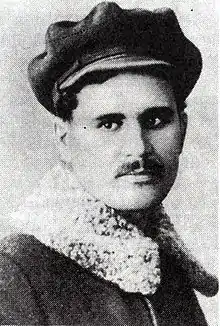Hryhorii Epik
Hryhorii Danylovych Epik (Ukrainian: Григорій Данилович Епік) (January 17, 1901 – November 3, 1937) was a Ukrainian writer and journalist. He supported the Soviet Ukrainization during the 1920s which probably led to his arrest and execution during the Great Purge in the 1930s.
Hryhorii Epik Григорій Данилович Епік | |
|---|---|
 | |
| Born | January 17, 1901 Kamianka, Russian Empire (now Dnipropetrovsk, Ukraine) |
| Died | November 3, 1937 Sandarmokh, Karelian ASSR, Soviet Union |
| Occupation | Writer, journalist |
| Nationality | Ukrainian |
Early life
After studies at a rural school in the big village of Kamianske, Yekaterinoslav Governorate (pop. ~20,000), he started to work at a railway workshop office. He was fired from his job in 1918 after he had taken part in anti-Hetmanate actions. In 1919, he joined the staff of the first volunteer Moscow regiment and took part in revolutionary events. In early 1920, he joined the Communist Party and the Revolutionary committee in Kamianske. He later moved to Poltava where he worked as a political instructor, secretary and chairman of a regional board. During the period of 1922–1924, Epik worked within the regional board of the Ukrainian branch of Komsomol and from 1924 to 1925, as an editor of Chervonyi shliakh (Red Road) in Kharkiv.[1]
Between 1925 and 1929, he studied in the department of Ukrainian history at the Kharkiv Institute of Red Professors. After graduating, he became the director of the Derzhlitvydav publishing house (State Publishing House).[2]
Writings
Epik's writings started to appear in print in 1923. He was a member of several Ukrainian literary organizations such as the Pluh, Prolitfront and VAPLITE (Free Academy of Proletarian Literature).[2] These organizations gathered many young members of the Ukrainian intelligentsia, who in the 1930s suffered severely during the Great Purge.[3]
In Epik's prose from the 1920s, he sharply criticized different aspects of the Soviet regime, particularly in Bez gruntu, 1928. His last novels from the 1930s, however, were written in the Stalinist spirit.[2]
During the late 1920s, Epik also was a screenwriter for the growing Ukrainian film industry.[4]
Repression and death
Even though Epik had continued to support the Communist Party, after the abrupt reversion of the Soviet Ukrainization in the early 1930s, he suffered from the purges. He was arrested on 5 December 1934, accused of being a Ukrainian nationalist and a member of a secret terrorist organization. In early 1935, he was sentenced to ten years of forced labour and sent to the Solovki prison camp in the White Sea.[1][5]
While on Solovki, he continued to write and even sent one of his works, Solovki stories, to the NKVD in Moscow. He was, afterwards, disappointed and stopped writing.[1]
Epik was one of the "lost transport" of prisoners shipped back to the mainland in 1937 from Solovki. It is now known that he was shot on 3 November 1937 at the killing field and burial ground called Sandarmokh near Medvezhyegorsk, in Karelia (then the Karelian ASSR), a site discovered in 1997 by the Memorial Society and its local head Yury A. Dmitriev.
Together with Epik 289 other members of the Ukrainian intelligentsia—such as Mykola Kulish, Valerian Pidmohylnyi, Yulian Shpol, Valerian Polishuk, Les Kurbas, Myroslav Irchan, and Mykola Zerov—were shot at Sandarmokh.[6][7]
Epik was posthumously rehabilitated in 1956 by the Military Collegium of the Supreme Court of the USSR.[1]
Bibliography
Short stories
- 1926 – Na zlomi (At the Break Point)
- 1928 – V snihakh (Amid the Snows)
- 1929 – Obloha (The Siege)
- 1930 – Tom satyry (A Volume of Satire)
Novels
- 1928 – Bez gruntu (Without Ground)
- 1929 – Zustrich (The meeting)
- 1930 – Nepiia (NEPia)
- 1931 – Persha vesna (The First Spring)
- 1932 – Petro Romen
References
- Biblioteka Ukraïnskoï Literatury
- Kubijovyč, Volodymyr (ed) (1984). Encyclopedia of Ukraine, vol 1. University of Toronto Press. p. 834. ISBN 0-8020-3362-8.CS1 maint: extra text: authors list (link)
- Kubijovyč, Volodymyr (ed) (1963). Ukraine. A Concise Encyclopædia, vol 1. University of Toronto Press. p. 1049.CS1 maint: extra text: authors list (link)
- Kubijovyč, Volodymyr (ed) (1971). Ukraine. A Concise Encyclopædia, vol 2. University of Toronto Press. p. 662. ISBN 0-8020-3261-3.CS1 maint: extra text: authors list (link)
- The Trident, vol 2. Organization for the Rebirth of Ukraine. 1941. p. 41.
- Pshenychny, Yurii (18 November 2008). "Bullet No. 188. Valerian Pidmohylny's last journey". Den. Retrieved 2009-01-15.
- Ovsiienko, Vasyl (6 November 2007). "Transport of death. The 70th anniversary of the Solovki executions". Den. Retrieved 2009-01-15.